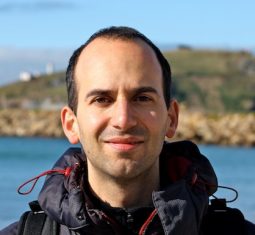Federico Baltar

2016: Dr Federico Baltar, University of Otago, Department of Marine Science, has been awarded a Rutherford Discovery Fellowship for research entitled: 'What makes ‘normal’ normal? Alternative microbial carbon and energy acquisition mechanisms in the neglected high-nutrient low-chlorophyll (HNLC) areas of the ocean'.
Biography
Dr Federico Baltar is a lecturer in Marine Science at University of Otago. He completed a PhD in Oceanography between the Royal Netherland Institute of Sea Research (NIOZ, Holland) and the University of Las Palmas de Gran Canaria (Spain), for which he received the Outstanding PhD Thesis Award. He then moved to Sweden to undertake a three year postdoctoral position at the Linnaeus University Center for Ecology and Evolution in Microbial Model Systems. His research in microbial oceanography integrates marine microbial ecology and biogeochemistry. His research group mainly focuses on the role of microbes on the marine biogeochemical cycles by looking at the factors that control microbial diversity and function, trying to follow a multidisciplinary approach with the aim to draw connections between different scientific disciplines. He has received different research-related awards, including the European Geosciences Union (EGU) Award for Outstanding Young Scientist in Biogeosciences (2016).
Research summary
Microorganisms in the ocean account for a very large part of the total biomass of life on Earth. These tiny powerhouses produce more than half of the entire global oxygen supply and, in doing so, use up a large proportion of human-generated CO2, a greenhouse gas that is accelerating global warming. To understand how marine ecosystems will respond to climate change we must first understand the mechanisms by which marine microbes work.
The majority of the research done in this field has been conducted in areas of the ocean considered ‘normal’, where primary production is not limited by trace metal availability (trace metals are required to form many important enzymes), and where the production of organic matter is enough to support the consumption of consumers. However, around 30% of the surface ocean lack trace metals (so called High Nutrient Low Chlorophyll, HNLC, regions). As this lack of trace metals inhibits primary production, the question is how do consumers of primary production are able to thrive in these HNLC environments.
Dr Baltar hypothesises that microbes in these regions might use alternative pathways for carbon and energy acquisition, and suggests to study this at the Subtropical Frontal Zone – a boundary between ‘normal’ and HNLC ocean regions located at our doorstep off the South Island. Thanks to the local ocean currents here, the physical distance between normal and HNLC ocean regions is minimal, which allows for the sampling of normal and HNLC regions over the cause of a day. The area therefore provides an optimal system to study the functional strategies of marine microbes in HNLC regions compared to ‘normal’ regions.
He will combine cutting-edge genomics techniques with experimentation to reveal the unique properties that enable marine microbes to thrive in HNLC environments and which microbes are the main drivers of these processes. By identifying the microbial mechanisms of action and their influence we will be able to understand the role of these magnificent marine microbes and better constrain the effect of climate change and human actions on the marine ecosystems.
